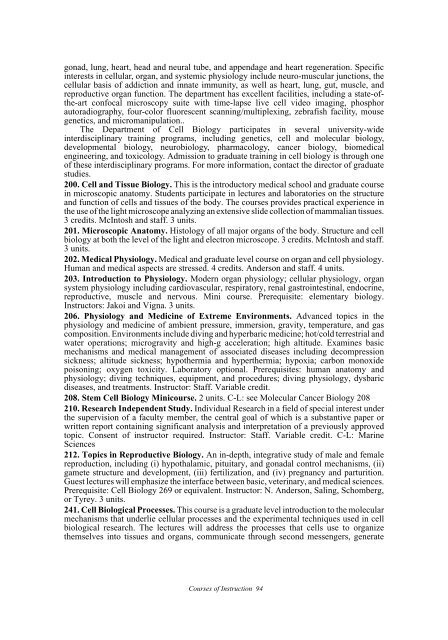Duke University 2008-2009 - Office of the Registrar - Duke University
Duke University 2008-2009 - Office of the Registrar - Duke University
Duke University 2008-2009 - Office of the Registrar - Duke University
You also want an ePaper? Increase the reach of your titles
YUMPU automatically turns print PDFs into web optimized ePapers that Google loves.
gonad, lung, heart, head and neural tube, and appendage and heart regeneration. Specific<br />
interests in cellular, organ, and systemic physiology include neuro-muscular junctions, <strong>the</strong><br />
cellular basis <strong>of</strong> addiction and innate immunity, as well as heart, lung, gut, muscle, and<br />
reproductive organ function. The department has excellent facilities, including a state-<strong>of</strong><strong>the</strong>-art<br />
confocal microscopy suite with time-lapse live cell video imaging, phosphor<br />
autoradiography, four-color fluorescent scanning/multiplexing, zebrafish facility, mouse<br />
genetics, and micromanipulation..<br />
The Department <strong>of</strong> Cell Biology participates in several university-wide<br />
interdisciplinary training programs, including genetics, cell and molecular biology,<br />
developmental biology, neurobiology, pharmacology, cancer biology, biomedical<br />
engineering, and toxicology. Admission to graduate training in cell biology is through one<br />
<strong>of</strong> <strong>the</strong>se interdisciplinary programs. For more information, contact <strong>the</strong> director <strong>of</strong> graduate<br />
studies.<br />
200. Cell and Tissue Biology. This is <strong>the</strong> introductory medical school and graduate course<br />
in microscopic anatomy. Students participate in lectures and laboratories on <strong>the</strong> structure<br />
and function <strong>of</strong> cells and tissues <strong>of</strong> <strong>the</strong> body. The courses provides practical experience in<br />
<strong>the</strong> use <strong>of</strong> <strong>the</strong> light microscope analyzing an extensive slide collection <strong>of</strong> mammalian tissues.<br />
3 credits. McIntosh and staff. 3 units.<br />
201. Microscopic Anatomy. Histology <strong>of</strong> all major organs <strong>of</strong> <strong>the</strong> body. Structure and cell<br />
biology at both <strong>the</strong> level <strong>of</strong> <strong>the</strong> light and electron microscope. 3 credits. McIntosh and staff.<br />
3 units.<br />
202. Medical Physiology. Medical and graduate level course on organ and cell physiology.<br />
Human and medical aspects are stressed. 4 credits. Anderson and staff. 4 units.<br />
203. Introduction to Physiology. Modern organ physiology; cellular physiology, organ<br />
system physiology including cardiovascular, respiratory, renal gastrointestinal, endocrine,<br />
reproductive, muscle and nervous. Mini course. Prerequisite: elementary biology.<br />
Instructors: Jakoi and Vigna. 3 units.<br />
206. Physiology and Medicine <strong>of</strong> Extreme Environments. Advanced topics in <strong>the</strong><br />
physiology and medicine <strong>of</strong> ambient pressure, immersion, gravity, temperature, and gas<br />
composition. Environments include diving and hyperbaric medicine; hot/cold terrestrial and<br />
water operations; microgravity and high-g acceleration; high altitude. Examines basic<br />
mechanisms and medical management <strong>of</strong> associated diseases including decompression<br />
sickness; altitude sickness; hypo<strong>the</strong>rmia and hyper<strong>the</strong>rmia; hypoxia; carbon monoxide<br />
poisoning; oxygen toxicity. Laboratory optional. Prerequisites: human anatomy and<br />
physiology; diving techniques, equipment, and procedures; diving physiology, dysbaric<br />
diseases, and treatments. Instructor: Staff. Variable credit.<br />
208. Stem Cell Biology Minicourse. 2 units. C-L: see Molecular Cancer Biology 208<br />
210. Research Independent Study. Individual Research in a field <strong>of</strong> special interest under<br />
<strong>the</strong> supervision <strong>of</strong> a faculty member, <strong>the</strong> central goal <strong>of</strong> which is a substantive paper or<br />
written report containing significant analysis and interpretation <strong>of</strong> a previously approved<br />
topic. Consent <strong>of</strong> instructor required. Instructor: Staff. Variable credit. C-L: Marine<br />
Sciences<br />
212. Topics in Reproductive Biology. An in-depth, integrative study <strong>of</strong> male and female<br />
reproduction, including (i) hypothalamic, pituitary, and gonadal control mechanisms, (ii)<br />
gamete structure and development, (iii) fertilization, and (iv) pregnancy and parturition.<br />
Guest lectures will emphasize <strong>the</strong> interface between basic, veterinary, and medical sciences.<br />
Prerequisite: Cell Biology 269 or equivalent. Instructor: N. Anderson, Saling, Schomberg,<br />
or Tyrey. 3 units.<br />
241. Cell Biological Processes. This course is a graduate level introduction to <strong>the</strong> molecular<br />
mechanisms that underlie cellular processes and <strong>the</strong> experimental techniques used in cell<br />
biological research. The lectures will address <strong>the</strong> processes that cells use to organize<br />
<strong>the</strong>mselves into tissues and organs, communicate through second messengers, generate<br />
Courses <strong>of</strong> Instruction 94









